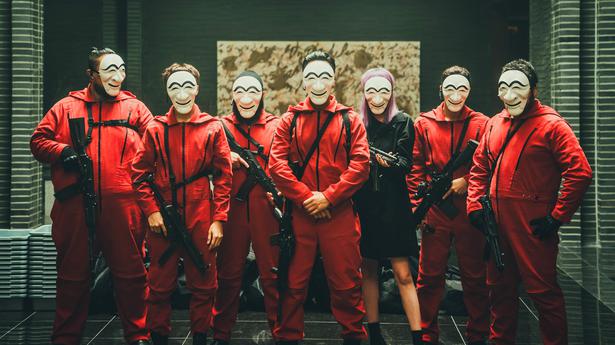
‘Money Heist: Korea’ review: A slick adaptation that needed more flamboyance
The Hindu
Apart from the fresh background against which the heist unfolds, the show remains an almost faithful remake of the original and it is this predictability which becomes its undoing
When Netflix released Álex Pina’s La Casa De Papel a few years ago, it didn’t take long for Money Heist, as we came to know it, to become a global sensation. Regarded among the streaming platform’s biggest hits worldwide, the announcement of a Korean remake later came as no surprise. South Korean shows over the last year have done exceptionally well for the platform, with the likes of Squid Game and All of us are Dead still being discovered on a daily basis.
The six episode Money Heist: Korea - Joint Economic Area gets a unique geopolitical setting. In 2025, South Korea and North Korea are no longer at war, and are on the brink of unification. Targeting the Unified Korean Mint at the Joint Economic Area between these two regions, the Professor (Yoo Ji-Tae) puts together a motley crew of thieves to pull off a heist, the likes of which the world hasn’t seen before.
A soldier and a BTS fan who moves from North Korea to the South, Tokyo (Jeon Jong-So) soon takes to crime before she is scouted by the Professor to join his crew of thieves. Berlin (Park Hae-Soo) is the only one who has managed to make it out of a North Korean Labour camp where he was imprisoned for 25 years. Father and Son duo Moscow (Lee Won-Jong) and Denver (Kim Ji-Hoon) who is a street fighter, con-artist Nairobi (Jang Yoon-Ju), hacker Rio (Lee Hyun-Woo) who is very reminiscent of a K-Pop Idol as the group says, and strongmen Oslo (Kim Ji-Hun) and Helsinki (Lee Kyu-Ho) make up the rest of the crew.
Like the original, the crew takes names of cities as its best to avoid knowing each other’s identities. Here though, Tokyo is rather indignantly asked by her Korean crew members why she picked Tokyo, the Japanese capital. She doesn’t bat an eyelid as she responds with, “Because we’re about to do something bad,” in a very loaded reference to the relations between the two countries.
As the heist progresses, we also see how the Professor has established a relationship with South Korean crisis negotiator Inspector Seon Woo-Jin (Kim Yun-Jin). There’s a slow build-up here for the burgeoning feelings that might expose the Professor’s moral compass, if it exists.
While the story almost faithfully sticks to the original, the unique setting emerges as the biggest highlight of this adaptation. There’s palpable tension between the workers at the Mint, and the task force officials who are both from North and South Korea. We also get elaborate backstories for some characters rooted in the social and economic outcomes of the geopolitical changes that have taken place. The simmering tension is also used by the crew as they attempt to keep the hostages in control. The North Korean hostages are told that they will be punished if a South Korea hostage steps out of line, and vice versa; Berlin says that this can be avoided if they keep an eye on each other.
While it starts off slow, the last three episodes are where a lot of the action is packed into. The ensemble cast is competent, but also a lot more toned down in this version. Hae-Soo as Berlin for instance is missing that unhinged streak, and the absence of a backstory with Rio has Jong-So as a rather mellow Tokyo. The actors however find their footing in the latter episodes once tensions are on the rise, and Ji-Hoon as Denver stands out among the crew inside the Mint. While Yoo Ji-Tae brings alive a staid, and much too-composed Professor on screen, it is Kim Yun-Jin who makes more of an impact as the harried, crisis negotiator who just can’t seem to figure out how the crew of thieves are constantly a step ahead of the task force.

National Press Day (November 16) was last week, and, as an entertainment journalist, I decided to base this column on a topic that is as personal as it is relevant — films on journalism and journalists. Journalism’s evolution has been depicted throughout the last 100-odd years thanks to pop culture, and the life and work of journalists have made for a wealth of memorable cinema.










